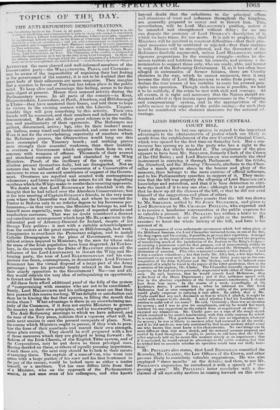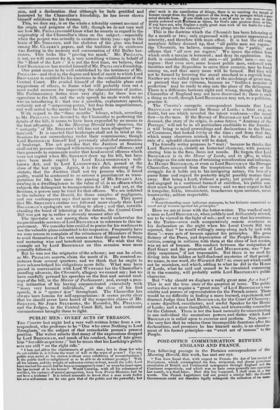LORD BROUGHAM AND THE CENTRAL COURT BILL.
THERE appears to be but one opinion in regard to the important advantages to the administration of justice which are likely to result from the establishment of the new Central Criminal Court, which was opened for the first time on Saturday last. But a con- troversy has sprung up as to the party who has a right to the merit of the Act which founded it. The originator of the plan appears to have been Mr. SHELTON, formerly Clerk of the Crown at the Old Bailey ; and Lord BROUGHAM was certainly the chief instrument in carrying it through Parliament. But the Globe, the Standard, and the Morning Chronicle, attribute to the Chan- cellor a much (Treater share in the honour and glory of the measure, than belongs to the mere exercise of official influence, and to his Parliamentary speeches in support of it. They main- tain that the bill was properly the offspring of Lord BROUGHAM'S knowledge and patriotism, and that it is base detraction to attri- bute the merit of it to any one else ; although it is not pretended that lie drew up all the clauses of the bill, or that he did not avail himself of the suggestions and plans of others.
On the other hand, the Times asserts that the bill was drawn by Mr. SHELTON, settled by Sir JOHN SYLVESTER, and given to Lord BROUGHAM by Mr. CHARLES PHILLIPS, who expected and is to receive a handsome remuneration at the public expense for so valuable a present. Mr. PHILLIPS has written a letter to the Morning Chronicle to set the public right on the matter. He assumes to know the whole history of the bill, and here is his account of it.
"in consequence of some unfortunate occurrences which had taken place at the Middlesex Sessions, the Lord Chancellor intimated to me, as one of the Bar, his deep regret, and his anxiety, if possible, to prevent their repetition. Amongst other things, in the course of conversation, his Lordship suggested the propriety of transferring much of the jurisdiction of the Justices to the King's Judges— of creating a permanent court for that purpose, and of concentrating within its control all the dense population for some miles around the Metropshs, without distinction of counties. This idea iniginated entirely within hirns,/t I said it was a curious coincidence ; but that really Mr. Alley had, a few days before, mentioned to me some such plan as having been thirty years ago in the con- templation of Sir John Sylvester and Mr. Shelton, and that he believed some memorial of it might he found in the papers of the latter gentleman, then in the pessession of his nephew, Mr. Clarke. The Chancellor naturally expressed his surprise, as he had not been personally acquainted with either of these gentle-. men. He said, however, that he would consult Lord Melbourne then at the bead of the Home Department ; and if that nobleman agreell with him in the absolute expediency of the Government's interference, I should hear from him again. In the course of a week, accordingly, at his Lordship's desire, I attended him ; when he informed me that Lord Melbourne had at once recognized the great utility of the principle, and would gladly cooperate in carrying it into effect. He added, that if Mr. Clarke could find any sueli document as that to which I alluded, it might be useful with respect to the details. I asked whether I had his Lordship's per- mission to make bst of his name? He said, Certainly ; there was no occasion for secrecy ; and I was to give his compliments, and say he would feel much indebted for any suggestions on the subject from so experienced an officer.' I executed my commission. Mr. Clarke gave me a copy of the rough sketch which remained in his uncle's handwriting, with that ready courtesy for which he is remarkable. That gentleman knows there was no stipulation whatever for secrecy; he was at liberty to mention what had occurred to all the world ; and if lie did not do so, was only restrained by that innate modesty which every one who knows him must know is his characteristic. No two things can be more different than that mere sketch, and the matured measure prepared and carried by Lord Brougham. I ought, in justice, to add here, that the Chan- cellor expressly told me he meant this measure merely as an experiment ; that if it succeeded; he would extend its advantages to the entire country, but that he wished first to ascertain whether its operation would turn out really bene- ficial."
Mr. PHILLIPS also states, that Lord BROUGHAM consulted the Recorder, Mr. CLARKE, the Law Officers of the Crown, and other persons likely to contribute valuable suggestions. He was also employed " three months" on the details ; and then, to use Mr. PHILLIPS'S expression, he introduced it with a speech of " sur- passing power. Mr. PHILLIPS'S letter concludes with a dis- claimer of all unworthy motives in coming forward on this occa-
sion, and a declaration that although he fecls gratified and honoured by the Chancellor's friendship, he has never shown himself solicitous for his favours.
This, we dare say, is on the whole a tolerably correct account of the origin and progress of the bill; though we do not very well see how Mr. PHILLIPS could know what he asserts in regard to the originality of the Chancellor's ideas on the subject, —especially when the project was actually in existence thirty year.: ago in the biain of Mr. SHELTON, and the skeleton of the plan was found among Mr. CLARKE'S papers, and the tradition of its existence was floating in the memory and conversation of Old Bailey bar- risters. This looks like "proving too much." Mr. PHILLIPS, is not, we will answer for it, a very unwilling witness in behalf of
the "Head of the Law:' it is not the first time, we believe, that Lord BROUGHAM has availed himself of Mr. PHILLIPS'S friendship. One point seems to be well established by the testimony of Mr. PHILLIPS—and that is, the degree and kind of merit to which Lord BROuGHAM is entitled for his exertions in the establishment of the Central Court. He availed himself of the valuable plans and suggestions of others, to frame what will probably turn out a most useful measure for improving the administration of justice.
his Parliamentary duties. were very slight ; for there was no opposition to the bill, and the only speech he made worth notice
was on introducing it : that was a sensible, explanatory speech, certainly not of "surpassing power," but free from impertinences, and well suited to the matter he bad in hand.
With regard to the "three months" labour, which, according to Mr. PH ILLI ps, was devoted by the Chancellor to perfecting the details of the bill, it seems to have been expended by no means to
the best advantage. As the Morning Herald truly observes, the "antiquity " of Mr. SHELTON'S bill has not been altogether " mo- dern:zed.' It is enacted that bankrupts shall not be tried at the Sessions for not surrendering under their commissions; though Lord BROUGHAM himself had previously abolished commissions
of bankrupt. The act provides that the Justices at Sessions
shall not try persons charged with certain non-capital offences ; and then proceeds to enumerate under that head several offences which
were not capital when Mr. SHELTON drew up his bill, but have since been made capital by Lord ELLENBOROUGH'S well- known Act, and by Lord LANSDOWNE'S Act, passed at the close of the last reign. Again, it is the plain meaning of the statute, that the Justices shall not try persons who, if found guilty, would be sentenced to so serious a punishment as trans-
portation for life ; but since the passing of Mr. EWART'S Act,
stealing in a dwellinghouse to the value of 5/. is an offence which subjects the delinquent to transportation for life : and yet, at the Sessions, a person may be tried for that offence. We are indebted
to the industry of the Herald, for these samples of negligence, and our contemporary says that more are to conic. They prove that Mr. SHELTON'S outline was followed more closely than Lord BRGUGHAM.S apologists are willing to allow ; and that, notwith- standing the boast of labouring at the details, the Central Court Bill was got up in rather a slovenly manner after all. The Spectator is not ammo." those who would undervalue the unquestionable services of LordBRouGHAm in reference to this im-
provement. We consider him entitled to praise for his readiness to use the valuable plans submitted to his inspection. Frequently have we seen reason to complain of the reluctance of Ministers of State
to avail themselves of the vast means at their disposal for forming and maturing wise and beneficial measures. We wish that the example set by Lord BROUGIIAM on this occasion were more generally followed. But he was not the originator of the scheme; nor can he alone, as Mr. PHILLIPS asserts, claim the merit of it. He received as-
sistance from several quarters; and we think that he ought to have acknowledged his obligations more fully. What may have passed in conversation with Lord WYNFORD (as the Chancellor's
standing advocate, the Chronicle, alleges) we cannot say ; but we have carefully perused his speeches on the first and second read- ings of the bill, in the Mirror of Parliament; and, except a pass-
ing intimation of his having communicated extensively with
"many very learned individuals," at the close of his first speech, it is " egomet ipse" throughout. The Chancellor has always been famous for self-appropriation : it seems pretty clear that we should never have heard of the respective shares of Mr. SHELTON, Sir JOHN SYLVESTER, the Recorder, Mr. PHILLIPS, and the Judges, in the Central Court Bill, had not accidental circumstances brought them to light.



















 Previous page
Previous page